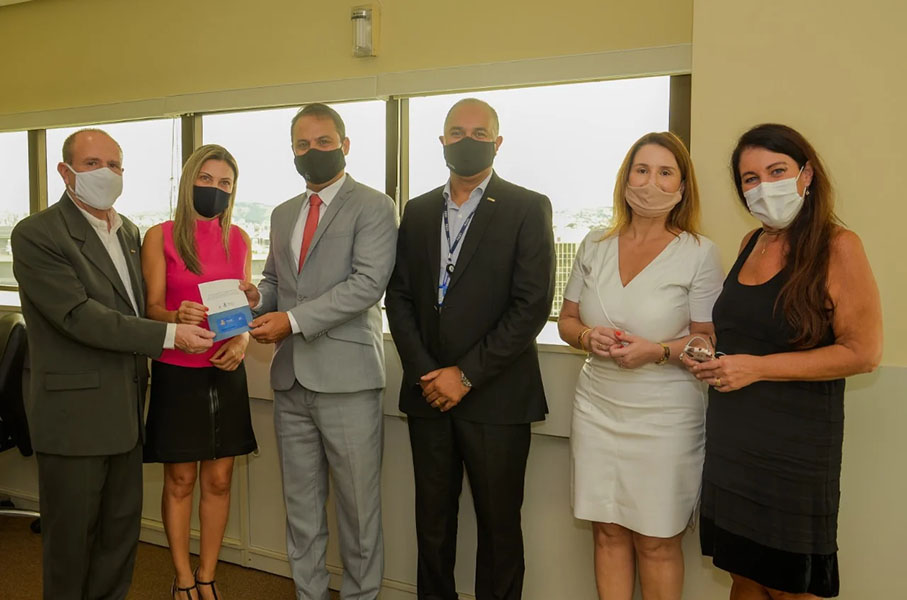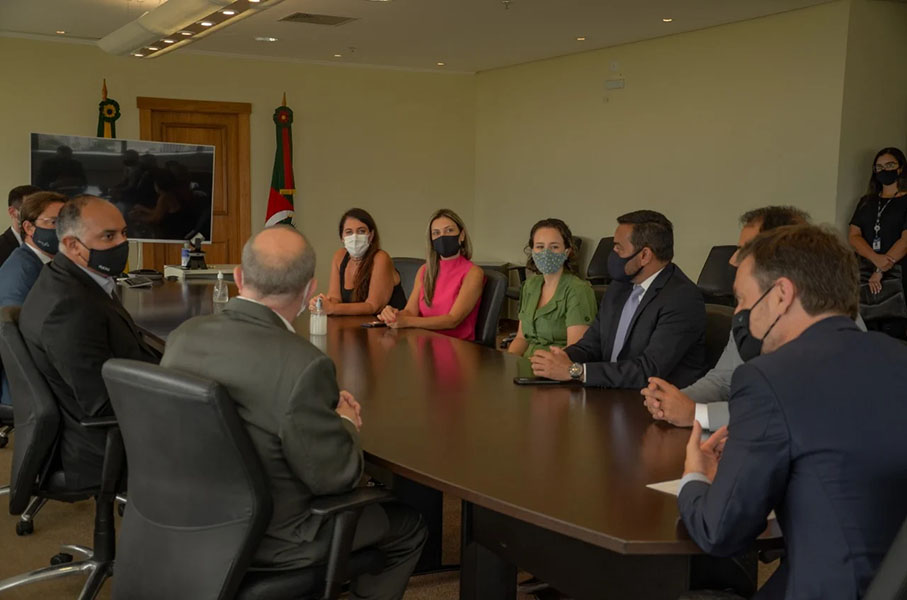Cooperation agreement with local authorities involves Computer Science professionals and School of Technology laboratories

Cooperation agreement between PUCRS and Public Prosecutor’s Office signed on Tuesday, Jan 12 / Image: Tiago Coutinho
On Tuesday, Jan 12, PUCRS and the Public Prosecutor’s Office of the State of Rio Grande do Sul (MP / RS), signed a cooperation agreement to provide disadvantaged public school students with cell phones seized by police authorities in jails. These cell phones will be of great advantage to students who cannot attend remote classes because of the pandemic. Known as Alquimia II (Alchemy II), the project will go on for two years, but may be extended.
In the coming weeks, PUCRS’ School of Technology will be receiving cell phones that were seized by the Public Prosecutor’s Office. Then, necessary changes will be made for students to get access to watch classes through the apps. As for old cell phones without apps, they will be given to principals and teachers to plan their school activities.
The President of the University, Br. Evilázio Teixeira, emphasizes that the institution understands that the education for a new future that is being redesigned will only be possible if guided by inclusive processes and actions to fight inequalities. “PUCRS is fully committed to these donations as they will benefit students from public schools that cannot attend classes today. We are aware of the needs and faithful to our partnership with the Public Prosecutor’s Office and other institutions in fostering actions intended to ensure children and adolescents’ rights to learn with dignity”, he highlights.
According to Public Prosecutor Fabiano Dallazen, the project is being carried out in different fronts throughout Rio Grande do Sul. “It is an initiative of social responsibility that has been shared between the parties. It started out at the Public Prosecutor’s Office of Osório and now has been replicated by the Government of the State of Rio Grande do Sul. We are very proud and happy to be celebrating this partnership with an institution as important as PUCRS,” Public Prosecutor Fabiano Dallazen says.
As soon as phones arrive at the University, they will be screened. A group of professionals will have a look at those that actually meet the needs of students. After that, they will be cleaned and formatted and the apps that will be used by students will be downloaded.
Professor Dr. Anderson Terroso, who is responsible for the project at the School of Technology, points out that, in addition to having a number of professionals engaged, PUCRS has electronic laboratories available to screen the cell phones. In the event that some of the cell phones are faulty, they will be properly discarded.
According to a report published in Nov 2020 by the United Nations International Emergency Fund for Children (Unicef), more than seven months after the pandemic began, Covid-19 continues to disrupt the education of more than 137 million children and adolescents in Latin America and the Caribbean. Estimates suggest that only one out of two public school students is having access to quality distance education at home, compared with three out of four private school students.
The fact that schools had to close their doors – a necessary measure to contain Covid-19 – has profound impacts on the lives of children and adolescents. Considering the inequalities of Brazil, remote learning did not work for both groups equally. Before the pandemic, the homes of 4.8 million students had no access to the internet. This has a strong impact on the opportunities for access to online education in the pandemic. In Aug 2020, according to Pnad Covid, 4 million elementary school students (14.4%) had no access to any school activity. The majority of those students are African Brazilian, whose family income is less than half the minimum wage.

Representatives of PUCRS and Public Prosecutor’s Office of the State of Rio Grande do Sul in meeting / Image: Tiago Coutinho
The solidarity project was organized by the Public Prosecutor’s Office / RS and the Institutional Relations of PUCRS, having mobilized members of the School of Technology to check on the available facilities. In addition to the President of PUCRS and the Public Prosecutor, the following people made their contributions: PUCRS’ Institutional Relations Agent, Solimar Amaro; the Deputy Public Prosecutor for Strategic Management Justice, Sérgio Hiane Harris; the Head Secretary, Júlio César de Melo; the Coordinator of the Center for Operational Support for Children, Youth, Education, Family and Succession, Denise Casanova Villela; the Coordinator of the Intelligence Center, Marcelo Tubino; the Public Prosecutor for Osório, Fernando Andrade Alves; the Osório Regional Education Agent, Cristiane Della Méa Corrales; and the Director of the Center for Studies and Professional Development, Caroline Vaz. Judge Anna Alice Schuh and Civil Police Chief João Henrique Gomes de Almeida, both from Osório, also joined forces and signed the agreement as witnesses.